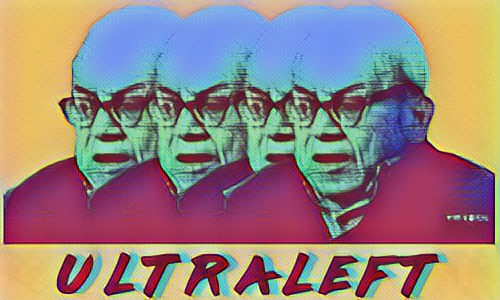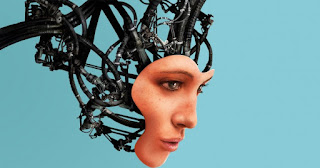Maoism or Taoism?
The Little Red Book
Anarcho-Maoism combines anarchist and Maoist ideals. It is particularly inspired by the Cultural Revolution when revolt against all organized society was encouraged. The ideas of anarcho-maoism can best be summed up with the phrase "to rebel is justified.”
Anarchomaoism emphasizes the chaotic aspects of Maoist revolution in opposition to status quo and established order. Anarchomaoism is influenced by elements of direct democracy, anarchism, and spontaneous order. Anarcho-Maoism emphasizes egalitarianism over established order.
The term “Mao-spontex” designates a political movement at the turn of Marxism and libertarian movements in Western Europe in the 1960s and 1970s. This neologism is a portmanteau derived from "Maoist" and "spontaneity.” Mao’s voluntarism- his belief that revolution depended not on objective conditions but on heroic acts of will- was well suited to the youthful insurrectionary exuberance of French students in Paris in the 1960s. Owing to their belief in spontaneity the student Maoists were known derisively as “les Maos-Spontex.”
Mao-Spontex came to represent an ideology promoting the ideas of Maoism, along with some ideas from Marxism and Leninism, but rejecting the total idea of Marxism–Leninism. Lenin's work What Is to Be Done? is criticized as dated and Lenin's critique of spontaneity is rejected. Lenin's idea of democratic centralism is supported as a way to organize a party, but a party must also have constant conflict inside of it to remain revolutionary. The revolutionary party discussed must also always be from a mass worker's movement. There must be revolution within revolution.
Revolutionary spontaneity, also known as spontaneism, is a revolutionary socialist tendency that believes the social revolution can and should occur spontaneously from below by the working class itself, without the aid or guidance of a vanguard party and that it cannot and should not be brought about by the actions of individuals such as professional revolutionaries or political parties who might attempt to foment such a revolution. Spontaneism remained a popular theory in opposition to communist centralism and influenced the autonomist movement in the 1970s.
Spontaneous order, also named self-organization, is the spontaneous emergence of order out of seeming chaos. It is a process in social networks including economics, though the term "self-organization" is more often used for physical changes and biological processes, while "spontaneous order" is typically used to describe the emergence of various kinds of social orders from a combination of self-interested individuals who are not intentionally trying to create order through planning. The evolution of life on Earth, language, crystal structure, the Internet and markets have all been proposed as examples of systems which evolved through spontaneous order. This is how the revolution must be organized from an autonomist, participatory, horizontal, bottom up spontaneous order amidst revolutionary conflict or creative destruction.
Anarchists argue that the state is in fact an artificial creation of the ruling elite, and that true spontaneous order would arise if it was eliminated. In the anarchist view, such spontaneous order would involve the voluntary cooperation of individuals.
Order will arise from chaos and the opposite also happens. This Taoist concept is strikingly similar to the idea of a spontaneous order.
While Taoism views self-interest versus other-interest as a false dichotomy, Hayek and others have a much more narrow definition of self-interest in mind which can line up quite well with the Taoist notion of wu-wei, of acting through non-action. Sometimes this is quite literal. Take the idea of creative destruction. Is there a much better phrase for Taoism than this? By letting go, by ending the illusion of control, we find that things fall into place much easier. We find that our most well intentioned plans could not begin to have created the order that arose.
Hayek was not only an advocate of spontaneous orders, but a libertarian as well. Taoism can start running into problems with modern American libertarianism when it comes to private property. While property can be useful by allowing for a legitimate sphere of autonomy for individuals, it can easily be used as a means of control.
Among Lao Tzu’s elusive truths are counterintuitive notions like “useful emptiness,” “dim brightness,” and the Chinese concept of wu wei, trying not to try, many of which revolve around the question of what power really means. Ursula K. Le Guin translated Lao Tzu’s Tao Te Ching. In a chapter titled “Techniques,” she explores the path to attaining these paradoxical powers:
Can you keep your soul in its body,
hold fast to the one,
and so learn to be whole?
Can you center your energy,
be soft, tender,
and so learn to be a baby?
Can you keep the deep water still and clear,
so it reflects without blurring?
Can you love people and run things,
and do so by not doing?
Opening, closing the Gate of Heaven,
can you be like a bird with her nestlings?
Piercing bright through the cosmos,
can you know by not knowing?
To give birth, to nourish,
to bear and not to own,
to act and not lay claim,
to lead and not to rule:
this is mysterious power.
One of Lao Tzu’s most timeless teachings is his idea about the true source of political power. Le Guin explains that Lao Tzu, a mystic, demystifies political power. Autocracy and oligarchy foster the beliefs that power is gained magically and retained by sacrifice, and that powerful people are genuinely superior to the powerless.
Lao Tzu does not see political power as magic. He sees rightful power as earned and wrongful power as usurped. He does not see power as virtue, but as the result of virtue. Direct democracies are founded on that view. He sees sacrifice of self or others as a corruption of power, and power as available to anybody who follows the Tao, or acting by non-action.
In fact there are striking philological similarities between ‘anarchism’ and ‘wu-wei’. Just as ‘an-archos’ in Greek means absence of a ruler, wu-wei means lack of wei, where wei refers to ‘artificial, contrived activity that interferes with spontaneous development’. From a political point of view, wei refers to the imposition of authority. To do something in accordance with wu-wei is therefore considered spontaneous; it leads to natural and spontaneous order. It has nothing to do with all forms of imposed authority.
‘Practice non-action. Work without doing,” Lao Tzu recommends. In their concept of wu-wei, the Taoists are not urging non-action in the sense of inertia, but rather condemning activity contrary to spontaneity. It is not idleness that they praise, but work without effort, anxiety and complication, work which goes with and not against the grain of things. If people practised wu-wei in the right spirit, work would lose its coercive aspect. It would be undertaken not for its useful results but for its intrinsic value.
This is a radically subversive attitude. No wonder anarchists and Taoists make good friends. Such radical subversiveness is ends without means. A societal spontaneous order emerges from revolutionary power in the hands of individuals. Mao was an authoritarian communist, but his tactic of revolution within revolution remains vital to a praxis of spontaneity not coercive conformity. This demonstrates how through a diversity of means, revolutionary praxis of libertarian socialism can integrate many sources of analysis without losing its ends. In the end, the French students of Paris in May 1968 adapted the Maoist populist ideal of the “mass line” to the ends of participatory democracy. This meant forgoing obsolete models of political vanguardism of the Jacobin-Leninist type in favor of the “self-organization” of society.




Comments
Post a Comment